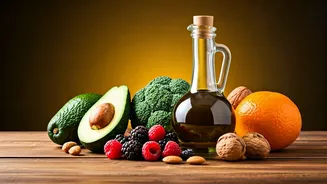Fatty Fish Power
Fatty fish, such as salmon, mackerel, and sardines, are rich in omega-3 fatty acids. These essential fats are well-regarded for their ability to enhance
HDL cholesterol levels. Omega-3s contribute to reducing inflammation and are crucial for the health of your arteries. Consuming fatty fish twice a week can provide your body with a substantial dose of these beneficial nutrients. Consider grilling, baking, or pan-searing these fish to maintain the health benefits and enjoy a flavorful meal. These fish not only elevate HDL but also support overall cardiovascular health, making them a delicious and effective choice for heart-conscious individuals.
Chia and Flax Seeds
Chia seeds and flax seeds offer an excellent source of soluble fiber, which is pivotal in boosting HDL cholesterol. They work by binding to cholesterol in the digestive system, facilitating its removal from the body. These tiny seeds are packed with nutrients and can be effortlessly incorporated into your diet. Add them to smoothies, sprinkle them on oatmeal, or mix them into yogurt to increase your fiber intake. Additionally, both chia and flax seeds contain omega-3 fatty acids, further supporting heart health. Regular consumption of these seeds can contribute to improved cholesterol profiles and a reduced risk of heart disease, as they are versatile additions to any meal.
Olive Oil's Benefits
Olive oil, especially extra virgin olive oil, is a source of monounsaturated fats. These fats can assist in raising HDL cholesterol. Regular use of olive oil in cooking and dressings provides a heart-healthy alternative to saturated fats. Its anti-inflammatory properties further protect your cardiovascular system. Choose extra virgin olive oil for its richer flavor and higher concentration of beneficial antioxidants. Utilize olive oil in your cooking to maintain its health benefits, and use it in salads to enjoy its benefits. Replacing unhealthy fats with olive oil is a straightforward step to promoting cardiovascular wellness and achieving a healthier lifestyle.
Oats and Whole Grains
Oats and whole grains, such as brown rice and quinoa, are high in soluble fiber, which plays a critical role in increasing HDL cholesterol levels. This type of fiber helps to trap cholesterol and remove it from your system. Start your day with a bowl of oatmeal or incorporate whole grains into your meals. These grains offer a wealth of nutrients and are an essential component of a balanced diet. Consuming whole grains regularly can also reduce the risk of heart disease and support overall well-being. Focusing on whole grain consumption is a simple change that can contribute significantly to better heart health and promote a healthier lifestyle.
Avocados: The Good Fat
Avocados are packed with monounsaturated fats, and they are beneficial for raising HDL cholesterol. These healthy fats can help to improve your cholesterol profile and overall heart health. Avocados also provide fiber, further supporting cardiovascular wellness. Including avocados in your diet is easy; add them to salads, spread them on toast, or incorporate them into smoothies. They bring a creamy texture and a wealth of nutrients to every meal. Embrace avocados as a tasty and effective way to promote heart health, and enjoy the delicious flavor and health benefits they provide.
Soy's Positive Impact
Soy products, like tofu and edamame, are a source of protein and contain compounds that can help boost HDL cholesterol. Soybeans offer several other nutrients that are good for your heart. Incorporate soy into your diet by adding tofu to stir-fries, having a bowl of edamame as a snack, or using soy milk in your coffee. Soy is a versatile and healthy addition to your diet. It can also help reduce the risk of heart disease. Choose soy products to support your heart health, and make it part of a balanced diet for overall wellness.
Nuts and their Fiber
Nuts, such as almonds, walnuts, and cashews, are beneficial for raising HDL cholesterol. Nuts provide healthy fats and fiber, along with other essential nutrients, contributing to cardiovascular health. Incorporating a handful of nuts into your daily routine is an easy way to support your heart. Enjoy them as a snack, add them to salads, or incorporate them into your yogurt. Nuts offer a convenient and delicious way to increase your HDL cholesterol levels. Nuts provide a tasty and effective addition to support heart health and promote overall well-being. Ensure the nuts are unsalted to maximize their health benefits.












